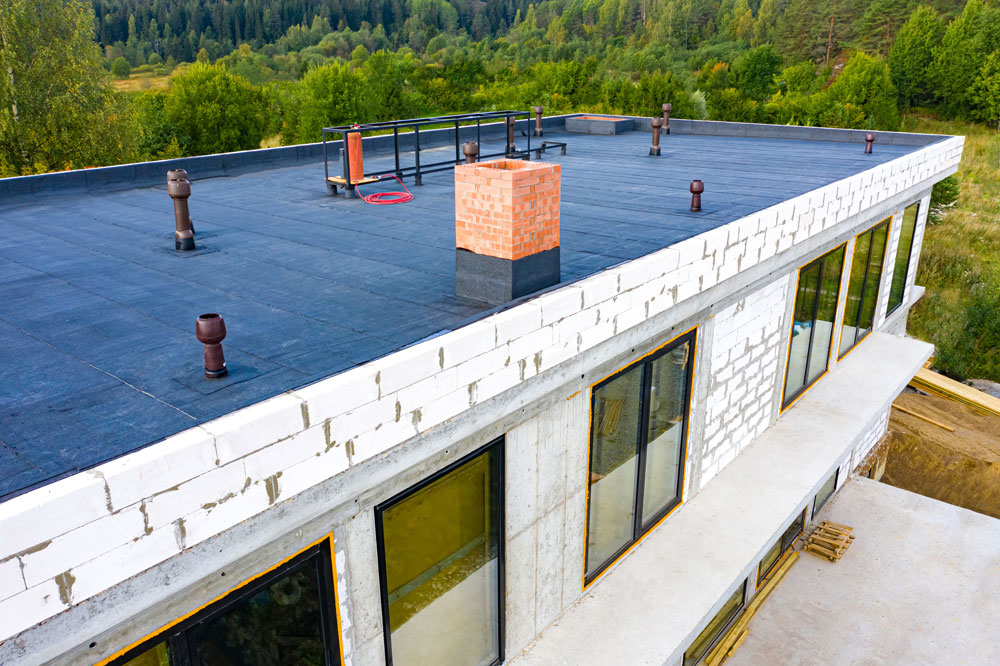ommercial property owners and property managers are keenly aware of the toll that Colorado weather is taking on their investments.
It’s unavoidable: over time, heavy rainfall, direct sunlight, hail, and sleet will do a number on even the most impervious flat or low-slope roof. This will happen regardless of the kind of roofing material that was used in its construction.
While many membrane-based commercial roofing solutions do a fantastic job of staving off the erosive effects of Colorado weather patterns, it’s going to be a matter of time before water ingress becomes an issue. And, because of the complexity involved in repairing commercial buildings, water damage can get very expensive to fix, very quickly.
To help combat the problems caused by water ingress, an ongoing strategy for waterproofing commercial roofs is needed. At A to Z Roofing, we’ve become Colorado’s go-to resource for weatherproofing commercial roofs, no matter what style, slope, or vintage.
To help you protect yourself against costly water damage, here are some things to consider when it comes to waterproofing your commercial roof.
An Ounce of Prevention = A Pound of Cure
The single best thing you can do to make sure that your commercial building doesn’t succumb to a leaky rooftop is to have it inspected at least once every year.
This is absolutely critical, and the reason is because problematic zones on your roof may not be obvious to anyone except a trained roofing professional. And, unless a roof tech physically walks your roof to inspect it for defects, potentially compromised areas could worsen as the Colorado weather intensifies throughout the year.
Another great tip is to have an inspection conducted following severe weather events like heavy rainstorms, hail storms, or blizzards. Colorado has no shortage of damaging winter weather in particular, so be especially mindful of the damage your roof could be incurring during the months between November and May.
Flat Roof Waterproofing Intervals
Most high-quality waterproofing applications for commercial roofing should last for at least ten years in most cases. This will obviously fluctuate based on just how bad the weather gets during that time frame. And, the more roof obstructions there are (things like AC units, chillers, vents, stovepipes, stacks, and exhausts), the higher the chances are that a leak may develop near them.
For TPO, EPDM, and PVC membrane roofing solutions, routine waterproofing treatments shouldn’t be necessary unless the membrane itself becomes damaged. But, again, you won’t know this damage is present unless an A-to-Z Roofing technician is able to inspect your roof to identify damaged areas.
For conventionally sloped commercial roofs (any roof that is pitched above 3:12 or so), waterproofing strategies get a lot more complicated. This is because roofs of this type aren’t always candidates for membrane-based roofing systems.
So, if your commercial building has a Gable, Dormer, Mansard, or other conventional-slope roof, you’re going to want to be extra-careful that inspections are done on a scheduled basis. The good news about roofs like these is that they generally do a better job of shedding water, snow, and sleet when compared flat or low-slope roofs. But, because they can’t be as effectively waterproofed as a flat roof can be, they can require a bit more maintenance over the long term.
The Metal Roof Factor
Metal roofs abound in Colorado. They are often very cost-effective, and they provide fairly good defense against the elements.
However, metal commercial roofs are prone to rust and corrosion unless they’re adequately treated with a waterproofing coating.
Thankfully, there are plenty of membrane-based waterproofing options available for commercial buildings with metal roofs. In many cases, the metal roof can remain fully in place while a flexible, synthetic rubber membrane is installed on top of it. This can have the dual effect of providing outstanding waterproofing to the roof while also reducing heating and cooling expenses, as the membrane itself acts as an insulator.
For Roof Waterproofing, Trust the Pros
No matter what style, size, or slope of your commercial Denver roof, A to Z Roofing has the equipment, materials, and expertise needed to ensure that it keeps water out. A sound roof waterproofing strategy is essential to safeguarding your real estate investment.
To learn more about how we can assist you, or to schedule a roof inspection conducted by one of our trained professionals, contact us today. We look forward to helping you get the most out of your Colorado roofing investment, season after season!

